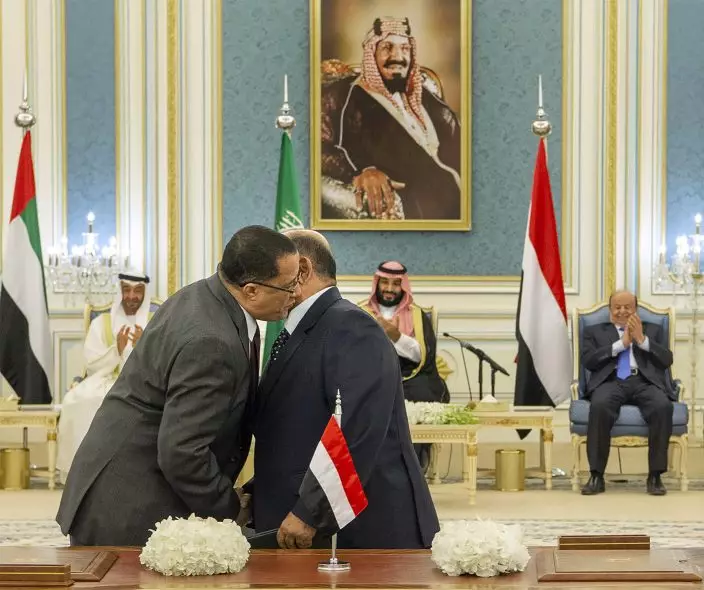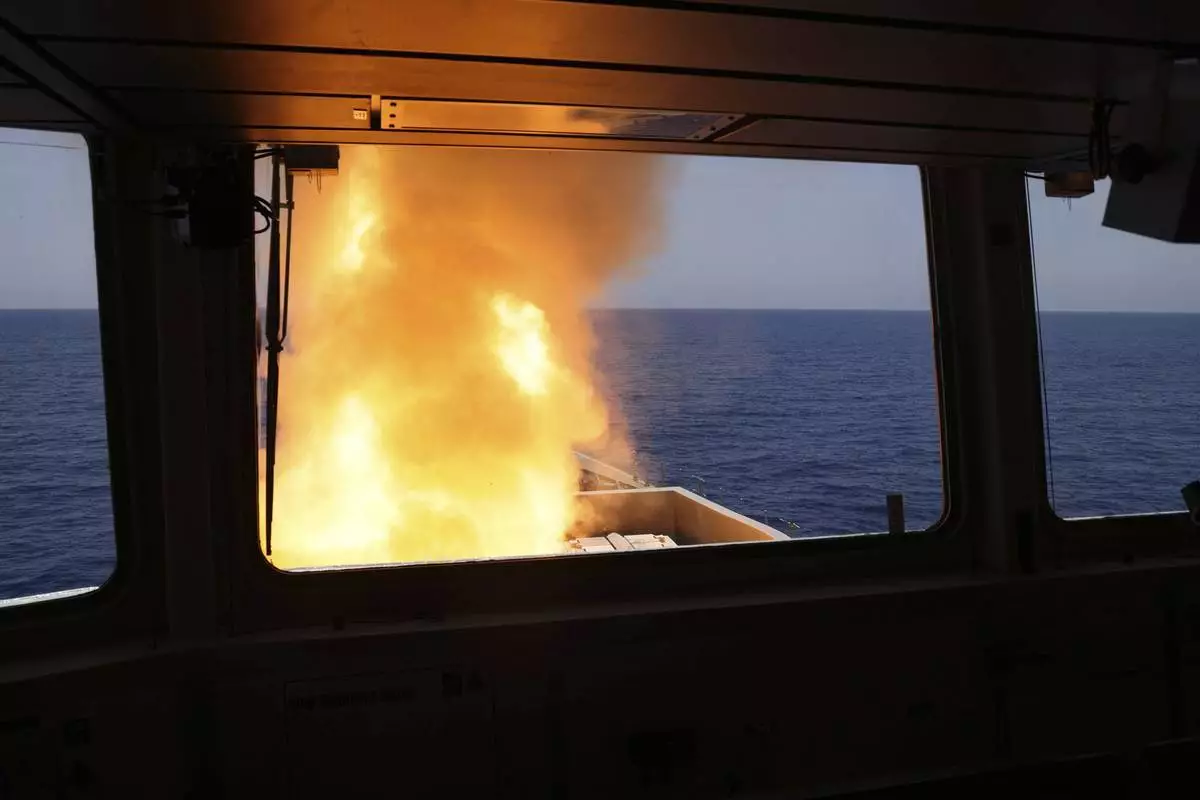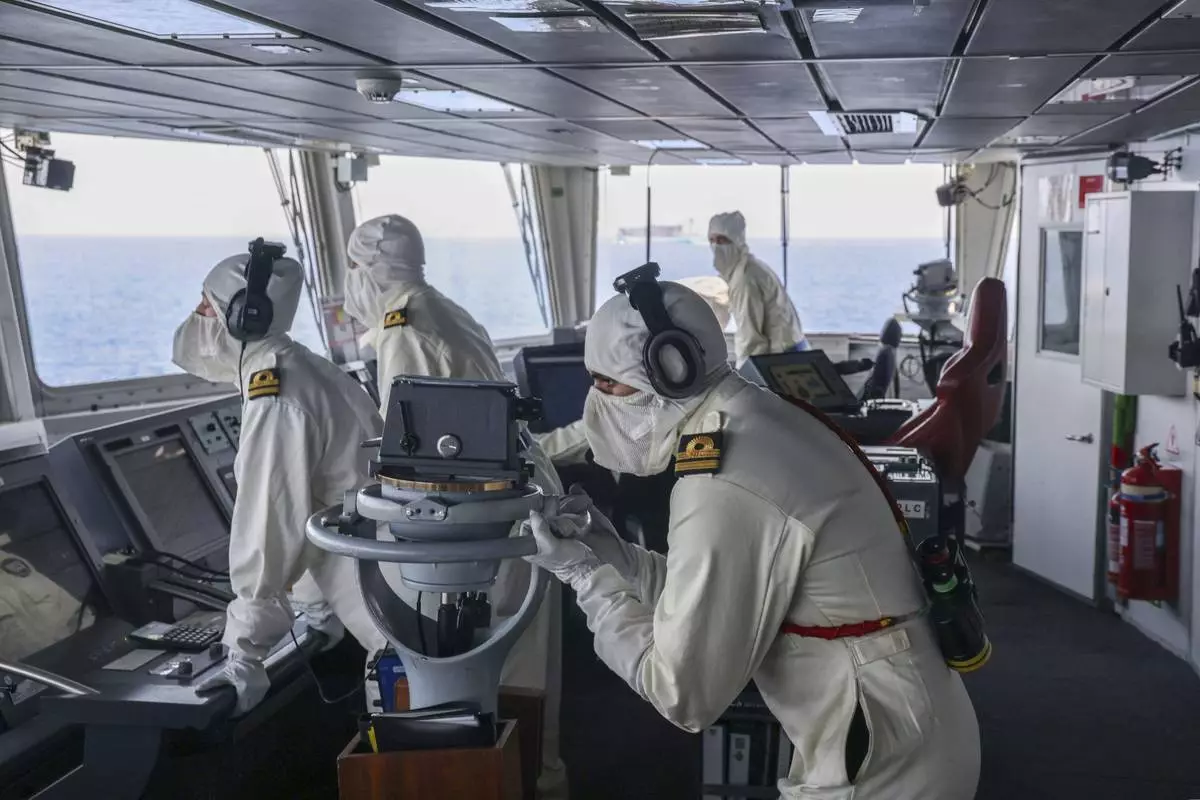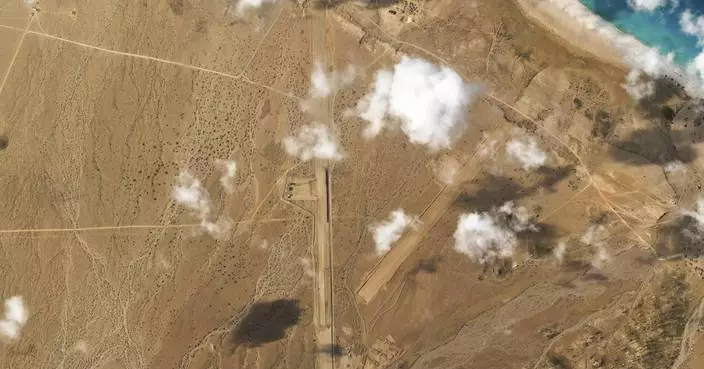The Saudi-led coalition embroiled in a years-long conflict in Yemen announced on Monday that Emirati-backed southern separatists and the country’s internationally recognized government have agreed to a cease-fire after months of infighting.
The agreement aims to close the rift between Saudi Arabia and the United Arab Emirates, nominal allies in a war against Yemen’s Iran-backed Houthi rebels.
Coalition spokesman Col. Turki al-Maliki said delegates from the separatists’ Southern Transitional Council and the Yemeni government are meeting in the Saudi capital of Riyadh to push the implementation of a November 2019 deal that ended earlier fighting.

FILE - In this Nov. 5, 2019 file photo, released by the Saudi Royal Palace, Yemeni Southern Transitional Council member and former Aden Governor Nasser al-Khabji, left, and Yemen's deputy Prime Minister Salem al-Khanbashi greet each other before signing a power-sharing deal witnessed by Yemen's president, Abed Rabbo Mansour Hadi, background right, Saudi Arabia's Crown Prince Mohammed bin Salman, center, and Abu Dhabi's Crown Prince, Mohammed bin Zayed Al Nahyan, in Riyadh, Saudi Arabia. A bid by the separatists to assert control over Yemen’s south has reopened a dangerous new front in the country’s civil war and pushed Yemen closer to fragmentation -- at a time when the coronavirus pandemic poses a growing threat. (Bandar AljaloudSaudi Royal Palace via AP, File)
Violence has flared between the separatist group and government forces since the Southern Transitional Council declared self-rule over the key port city Aden and other southern provinces in April. The renewed clashes reopened a new front inside the larger civil war, which has killed over 112,000 people and ignited what the United Nations has labeled the world’s worst humanitarian crisis.
The intensifying split in the south has also hobbled authorities’ response to the coronavirus pandemic and complicated attempts to jump-start a wider peace process.
Al-Maliki denounced recent clashes in the remote island of Socotra in the Gulf of Aden, a UNESCO World Heritage site, as well as the southern province of Abyan.
The STC appointed a new Socotra governor Monday after the separatists effectively seized control of the area amid fighting that threatened to cause irreparable harm to the island's rare plant and animal species. The Yemeni government rejected the secessionists' advances as a “coup” and on Monday called for the release of local journalist Abdullah Badhan, who was arrested in a sweep of civilians who opposed the Emirati presence on the archipelago, according to the Information Ministry.
The secessionists’ sudden victory in Socotra appears to have given the group leverage in truce negotiations.
The coalition urged all parties to “stop the bloodshed by adhering to the Riyadh agreement," which stipulated the handover of heavy weapons, the withdrawal of rival forces and the formation of a new government. Al-Maliki said the coalition would deploy forces to monitor a cease-fire in the flashpoint Abyan governorate, which lies between government and separatist forces.
Nizar Haitham, a spokesman for the STC, welcomed the coalition’s calls for a cease-fire and de-escalation across Yemen’s southern governorates. In a statement, he emphasized the urgent need to implement the Riyadh deal and thanked Saudi Arabia for its diplomatic role.
Three officials in the council’s leadership said that while the separatists stood by their declaration of self-rule, they were open to Saudi-led negotiations. They spoke on condition of anonymity because they weren’t authorized to brief the media.
Rajeh Badi, a spokesman for Yemen's government, said it welcomed the move and would work toward de-escalation across the southern provinces. UAE’s Minister of State for Foreign Affairs, Anwar Gargash, tweeted his appreciation for Saudi Arabia’s “relentless efforts to achieve stability in Yemen.”
Yemen’s descent into turmoil started in 2014 when the Shiite Houthi rebels overran the capital, Sanaa, and much of the country’s north, driving the government of President Abed Rabbo Mansour Hadi into exile.
A U.S.-backed, Saudi-led coalition intervened the following year to try and restore Hadi's rule. The costly war has settled into a stalemate, compelling major regional players to seek a way out. This spring, Saudi Arabia declared a unilateral cease-fire, which quickly collapsed.
As the rebels gain ground in the north, near the Saudi border, the kingdom “wants to invest in seeing a unified Yemeni front against the Houthis,” said Fatima Abo Alasrar, a non-resident scholar at the Washington-based Middle East Institute. The government has rapidly lost credibility, she said, leaving Saudi Arabia “in an embarrassing position,” caught between Hadi and the separatists even as the Houthis escalate their attacks.
Late Monday, the Saudi-led coalition said it intercepted “a number” of bomb-carrying drones launched by the Houthis targeting the kingdom. A brief statement on the state-run Saudi Press Agency suggested other drones may have slipped passed Saudi air defenses, without elaborating. The rebels have struck the kingdom with both drones and cruise missiles during the years-long war.
Last summer, the UAE withdrew its forces and said it was ending its role in the conflict. But experts say it continues to wield influence through its proxies to ensure control of key areas on Yemen’s 2,000 kilometers (1,250 miles) of coastline. The country lies on a strategic waterway leading to the Persian Gulf, through which much of the world’s oil flows.
The secessionist council, which is an umbrella group of heavily armed and well-financed militias propped up by the UAE since 2015, hopes to restore an independent southern Yemen, which existed from 1967 until unification in 1990.
Associated Press writers Jon Gambrell in Dubai, United Arab Emirates, and Isabel DeBre in Cairo contributed to this report.







